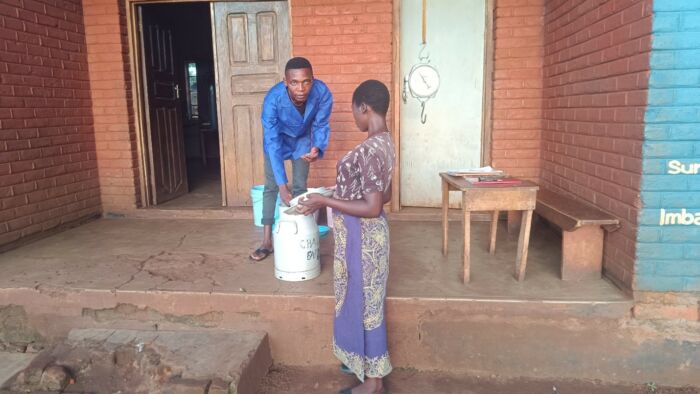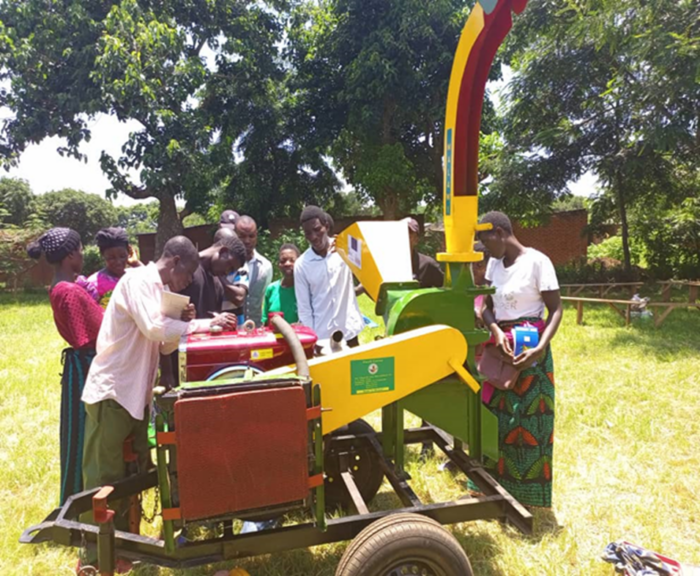The Agricord- Malawi Dairy Value Chain project, which is being implemented by the Central Region Milk Producers Association (CREMPA) in collaboration with We Effect, has brought about transformative changes in the lives of dairy farmers by promoting ownership, inclusion, and gender transformation. The Farmers’ Organizations for Africa, Caribbean and Pacific (FO4ACP) has produced results that have supported the achievement of the project objectives and have laid the foundation for rights holder-led sustainable dairy development for both member based cooperatives (MBCs) and the whole farmer organisation (FO) in general.
The project has implemented capacity building activities that have strengthened the FO and the MBCs in various areas, improved capacity of MBC level service providers and equipped the MBCs with productive assets, create additional income generating activities and promoted meaningful and active participation of women and youth. The project’s impactful investment in productive assets, empowerment of MBC level service providers, strengthening organizational structures, and meaningful and active participation of women and youth has resulted in strengthened FO and the MBCs in various areas, improved capacity of MBC level service providers and equipped the MBCs with productive assets, create additional income generating activities.
The projects’ rights holders have been supported with assets to put into practice knowledge gained from capacity building activities. This has made it easy for participants to benefit more from the knowledge through creation of income generating activities and have the ability to sustainably continue with the initiatives that the project has established. Rights holders are able to use knowledge in feed making to operate feed making machinery to produce livestock feed and study circle organisers and study circle groups have been supported with study circle materials to ensure that they make the most of the new participatory extension method.
Smallholder farmers benefited from increased milk production and improved milk quality through improved access to veterinary services, the project procured veterinary drugs that have been used to treat livestock. A key highlight of this initiative is that mastitis cases have been treated and cases of milk souring due to this condition have decreased.
Market linkages were established between smallholder farmers and formal milk processors, creating a reliable market for their products. This was achieved through facilitating meetings where marketing challenges were presented to relevant stakeholders and solutions were discussed. Through this project, CREMPA was able to revise off-taker agreements of some MBCs, and lobbied for the increase in farm gate prices for MWK210 in 2021 to MWK425 in 2024 ensuring that smallholder farmers are able to increase revenue.

– We had no voice, issues concerning milk prices were being discussed behind our backs, with the support from We Effect are now part of these discussions but we also have the capacity to call for meetings when issues about milk marketing arise, narrated Ireen M’bachundu, a female dairy farmer.
The FO has achieved improved technical capacity through working with We Effect in this project. The work of this project has seen the FO put in place working systems to ensure transparency and accountability to the rights holders and partners thereby strengthening the FO’s capacity to implement this project. We Effect also supported the FO to conduct organizational self-assessment to identify capacity gaps and areas for support and this has resulted in the FO improving the human resource capacity in financial management and resource mobilization.
– We Effect has taken us on a path of growth and progress that has seen us improve our service delivery to the members who are the real owners of CREMPA. We know where we are going and how to get there all thanks to our partnership with We Effect remarked CREMPA Board chair on reflection of the partnership.
Gender transformation has brought about visible change in attitudes on all levels of the FO. The MBCs have seen active women participation in dairy development activities at household level such as milk marketing, attending trainings and investing returns from dairy farming and women are participating in governance and leadership roles that were originally dominated by men such as MBC committees, zonal leadership roles and participating in trainings to be local service providers to fellow members. A highlight of this transformation is that women members would initially transfer membership to husbands when they get access to productive asset like cows from MBCs and passively support husbandry practices at household level but that has changed as female members are actively managing their dairy farming and are in charge of all levels of production and are primary decision makers on the use of revenue from dairy farming.
A female trained machinery operator Zelesi Daimon described her transformation as follows
I am testament of the gender transformation that has occurred here, before this project I had never seen a woman operate machinery, we have heard about progressive women doing male jobs in the cities but we never witnessed it here. This project has trained me and trusted me to operate the machinery they gave us and I am able to do my job
The project has addressed livestock feed challenges, been providing training on feed production and encouraging preservation of crop residues. In addition, the project supported the dairy farmers with feed millers and choppers to minimize forage wasted while enhancing production. The FO has empowered farmers, particularly women, created a sustainable and efficient dairy value chain as well as promoting Sustainable Agricultural Land Management (SALM) practices by utilizing livestock manure for irrigation farming.
Introduction of new methodologies has also been a highlight of this partnership as CREMPA has introduced and scaled-up the study circle methodology as a new participatory approach to dairy extension. The study circle methodology has empowered dairy farmers to have a platform where they can share knowledge and discuss issues of common interest and has resulted in farmers using the study circle groups as Groups Savings and Loans Groups (GSALGS) in addition to sharing dairy extension. The empowerment of farmers to have a platform for knowledge sharing has addressed the challenge of shortage of extension workers.

One of the key objectives of the Malawi Dairy Value Chain project is to equip farmers with the knowledge and resources to produce high-quality concentrate feed for their dairy cows. Through comprehensive training programs, farmers from the project areas have acquired the necessary skills to make livestock feed. The project has emphasized the importance of utilizing local resources and crop residues effectively. As a result, farmers have not only learned to process legumes and maize into concentrates but have also used the diesel-powered chuff cutters to grind crop residues into hay thereby ensuring a constant supply of nutritious feed for their livestock.

